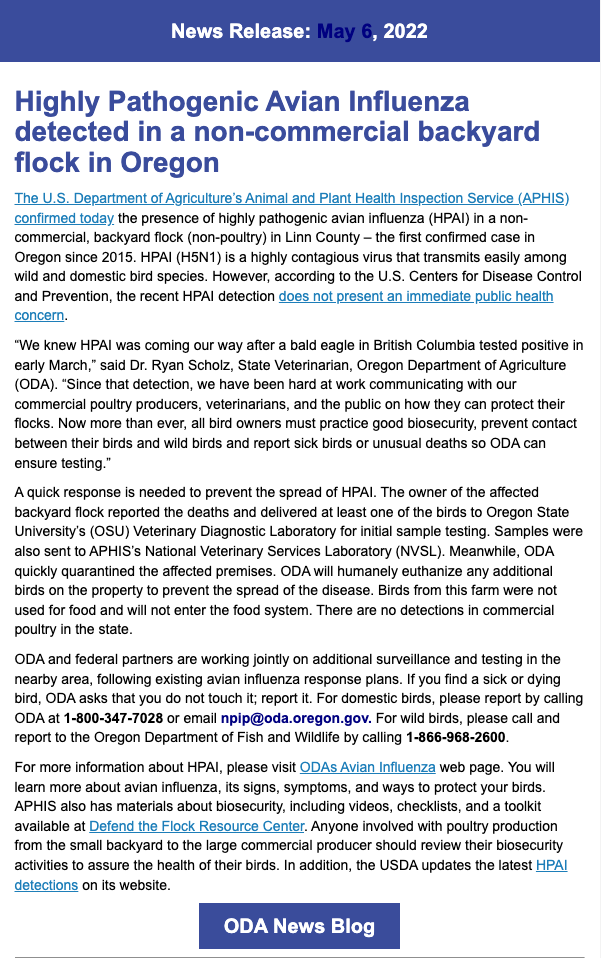Highly contagious avian influenza found in Oregon; Bend owner of chickens taking precautions

(Update: Adding video, comments from Bend chickens owner, news conference )
CDC says it does not present an immediate public health concern
BEND, Ore. (KTVZ) -- The U.S. Department of Agriculture’s Animal and Plant Health Inspection Service confirmed Friday the presence of highly pathogenic avian influenza (HPAI) in a non-commercial, backyard flock (non-poultry) in Linn County – the first confirmed case in Oregon since 2015.
And since the outbreak has been spreading for some time, with millions of chickens and turkeys culled, many bird owners, including on the High Desert, have already been taking precautions.
Southwest Bend chicken owner Annie Chrietzberg told NewsChannel 21 Friday she was aware of the growing nationwide outbreak. She says she has seen it on the news and that there are two active groups on Facebook for local chicken owners. She started taking precautions last week to save her birds.
Chrietzberg's chickens are in her backyard, enclosed and protected from the sky and wild birds. She said she'll isolate them completely, if needed. The birds' food and water are underneath the canopy, so wild bird droppings cannot get in them.
"We bought a carport canopy, so that if the bird flu sweeps through, we can enclose the chickens during the day, and part of that enclosure is keeping all the wild birds away from them," Chrietzberg said. "So I have four walls I can enclose them with, and I got the canopy with windows that can go up, so they can have ventilation."
Several geese in a noncommercial flock of about 100 waterfowl died suddenly on a farm in Linn County, and federal authorities confirmed Friday that they died of the avian flu. Also Friday, authorities in Washington state received word that chickens and turkeys in a flock of about 50 birds at a noncommercial farm in Pacific County, Washington, also had the disease.
Dana R. Dobbs, a veterinarian with Washington state, said, "In this particular outbreak, it has been primarily introduced by wild waterfowl that are migrating, and right now the birds are migrating back north."
Chrietzberg owns chickens for the quality of their eggs.
"I always wanted to have chickens, and when I bought this home a year ago, I was able to do that," she said. "The eggs are amazing, because my birds get fresh greens every morning -- kale, cilantro and parsley, and fermented grains. They're very spoiled. They're not really farm animals, they're more like pets."
She said she loves to sit outside on a nice day and watch Peri, Fernando and Margarite.
Some of the infected birds in Linn County have died. The Oregon Department of Agriculture says the rest will be humanely euthanized.
HPAI (H5N1) is a highly contagious virus that transmits easily among wild and domestic bird species. However, according to the U.S. Centers for Disease Control and Prevention, the recent HPAI detection does not present an immediate public health concern.
“We knew HPAI was coming our way after a bald eagle in British Columbia tested positive in early March,” said Dr. Ryan Scholz, State Veterinarian with the Oregon Department of Agriculture. “Since that detection, we have been hard at work communicating with our commercial poultry producers, veterinarians and the public on how they can protect their flocks.
"Now more than ever, all bird owners must practice good biosecurity, prevent contact between their birds and wild birds and report sick birds or unusual deaths so ODA can ensure testing.”
A quick response is needed to prevent the spread of HPAI, ODA said Friday. The owner of the affected backyard flock reported the deaths and delivered at least one of the birds to Oregon State University’s Veterinary Diagnostic Laboratory for initial sample testing. Samples were also sent to APHIS’s National Veterinary Services Laboratory.
Meanwhile, ODA quickly quarantined the affected premises. ODA will humanely euthanize any additional birds on the property to prevent the spread of the disease. Birds from this farm were not used for food and will not enter the food system. There are no detections in commercial poultry in the state.
ODA and federal partners are working jointly on additional surveillance and testing in the nearby area, following existing avian influenza response plans.
Dr. Ryan Scholz, Oregon's state veterinarian, said of the Linn County case, “The long and the short of it is the producer noticed that one day a crow flew in with some of his chickens -- and the next day, he literally described that they were dropping like flies.”
“We want to contain and eradicate this disease as soon as possible, to protect our commercial poultry industry, as well as some of our backyard flocks that are selling eggs and doing things like that,” Scholz said.
The cases do not pose a risk to humans, and birds from the farms were not used for food.
Northwest wildlife and agricultural officials said the virus seems to primarily affect waterfowl, but people who feed songbirds should take extra steps to clean their feeders frequently out of an abundance of caution.
There are no detections of the avian flu in commercial poultry in either state, they said
If you find a sick or dying bird, ODA asks that you do not touch it; report it. For domestic birds, please report by calling ODA at 1-800-347-7028 or email npip@oda.oregon.gov. For wild birds, please call and report to the Oregon Department of Fish and Wildlife by calling 1-866-968-2600.
For more information about HPAI, visit ODAs Avian Influenza web page. You will learn more about avian influenza, its signs, symptoms, and ways to protect your birds.
APHIS also has materials about biosecurity, including videos, checklists, and a toolkit available at Defend the Flock Resource Center.
Anyone involved with poultry production, from the small backyard to the large commercial producer, should review their biosecurity activities to assure the health of their birds. In addition, the USDA updates the latest HPAI detections on its website.